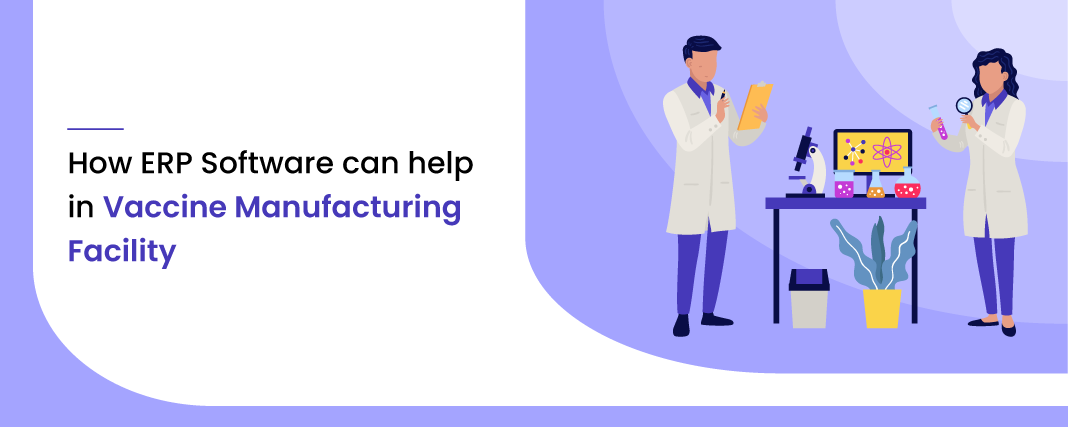“If it ain’t broke, don’t fix it”- Bert Lance.
The above words prove true for almost all of our human tendencies regarding putting things off until it becomes imperative. Something like this happened when the COVID-19 pandemic hit the world last year. Many people knew about its existence, but we didn’t pay attention until it posed a fatal threat. We walked into it without knowing the gravity of the situation.

Looking for ERP Software? Check out SoftwareSuggest’s list of the best ERP software solutions.
Having spent an entire year at home due to the pandemic, the innovations still didn’t stop. From the recently introduced vaccine for COVID-19 to how we are administering it, everything has been a groundbreaking experience. But what we fail to fathom is what goes behind the scenes of manufacturing the vaccine itself.
To ensure high levels of quality standards, vaccine manufacturing needs accurate, actionable information at the right time. A system should be in a place that centralizes management and quickens decision-making. Such a system will help reduce costs, streamline operations and maximize efficiency. This, in turn, will result in a high-value output that is both valuable and scalable.
Vaccine manufacturing in itself is a process of enterprise production planning. And hence, like any other resource, it needs meticulous planning to be made correctly in the first attempt itself. Before the vaccine can ever reach the pharmacy, it has a lot of steps to go through. These involve development, testing, approval, standardization, manufacturing, and then finally, commercialization.
To make sure that happens during the vaccine manufacturing process, an ERP system is the best resort. Systems have been designed to ensure maximum output with the right amount of resources, minimal costs, and high-quality standards. So considering vaccines as a resource, an ERP can help streamline the entire process.
9 ways an ERP system can help the vaccine manufacturing process
Here are the ways an ERP can help make the vaccine manufacturing process:
1. Managing and safeguarding the formula
Any vaccine is based on a formula, and its formula is one of the top-secret things for any company. An ERP system can ensure that the right proportions of the procedure are used in the actual vaccine manufacturing process.
Also, the ERP can safeguard it. Provided that the right kind of privilege access is built into the software, the formula can be protected from any attacks from prying eyes.
2. Meeting guidelines and compliances
No medicine can see the light of day until it adheres to the board’s compliance and approvals. Whether it’s an FDA guideline or a cGMP norm, an ERP solution can help.
A System can efficiently manage workflows, execute SOPs, customer-centric COA, and approval controls to generate BMR plus MBR and audit trails.
3. Quality control
Every pharma company has to uphold the highest standards of quality during vaccine manufacturing. For this, cGMP norms are built-in to the ERP system itself. The QC module, when activated, makes quality a crucial part of the overall process.
The module ensures conformance with cGMP norms and allows only the best material to be used. The inappropriate material is sent as wastage or returned to the supplier, along with all the documentation.
4. Managing supply-chain from suppliers
When running a manufacturing plant, the supply chain is a crucial part. The manufacturing ERP helps maintain a steady flow of processes and work from the raw material to the final product. All of this helps in increasing the throughput, reducing costs, and overall improved efficiency.
5. Inventory management
Since the raw material is being used, it must be tracked and ordered beforehand to maintain a smooth process.
ERP systems come with inventory management protocols that plan and inform the supervisors about low inventories. They can then use the supply chain management algorithms to suggest the most optimal suppliers and order routes. Hence, taking all the operational time out of the process.
6. Support for trials and commercialization
The term “clinical trials” has been thrown around a lot during our wait for the COVID-19 vaccine. One of an ERP system’s jobs is maintaining a whole database of all clinical trials’ details.
From the person’s details to the vaccine’s reaction, maintaining physical records is not feasible. Hence, a manufacturing system can easily create digital documents for the same and make the task easier.
7. Reducing costs
Making vaccines, like any other process, is a manufacturing process. Hence, various costs are involved. While the fixed costs can not be altered, you can minimize additional charges such as overheads, delays, or breakdowns.
An ERP for manufacturing also runs diagnostic details on the entire machinery. A set plan of timely maintenance is also drawn up. This helps the management to plan ahead and then take into account the time and costs needed. Since upkeep and all the other expenses are already planned, the overall production costs are reduced. This paves the way for increased profits.
8. Real-Time resource allocation
A common thing for many manufacturing industries is running out of resources in the middle of an operation. Vaccine manufacturing is no different. Especially when supplies for COVID-19 vaccines are running low, real-time resource allocation becomes very important.
An ERP system can efficiently allocate the existing resources to ensure an equivalent quality product. However, it will also warn the management and the supervisors to replenish the exhausted materials to adhere to the norms.
9. Automation of operational work
Operational work chases us everywhere, from filling in those excel sheets to arranging the data in a set form. In the process of vaccine manufacturing, this operational work is a matter of life and death (quite literally). However, the same process that takes excessive human hours can be done in a jiffy to automate it.
An ERP system can preemptively lay down specifics about the scope of automation and reduce manual labor for increased output. Ranging from filling in sheets to checking things off from the task list, Also can do all of it and more.
There is no harm, and mostly all are only benefits. From a mundane old-school manufacturing plant to a well-oiled machine that is all set to alleviate our pains from COVID-19, ERP can do all that for you. Hence, implementing ERP will improve the number of response units we have for the disease. All of which will lead to us resorting to our old care-free lifestyle of Bert Lance.
Need Any Technology Assistance? Call Pursho @ 0731-6725516




